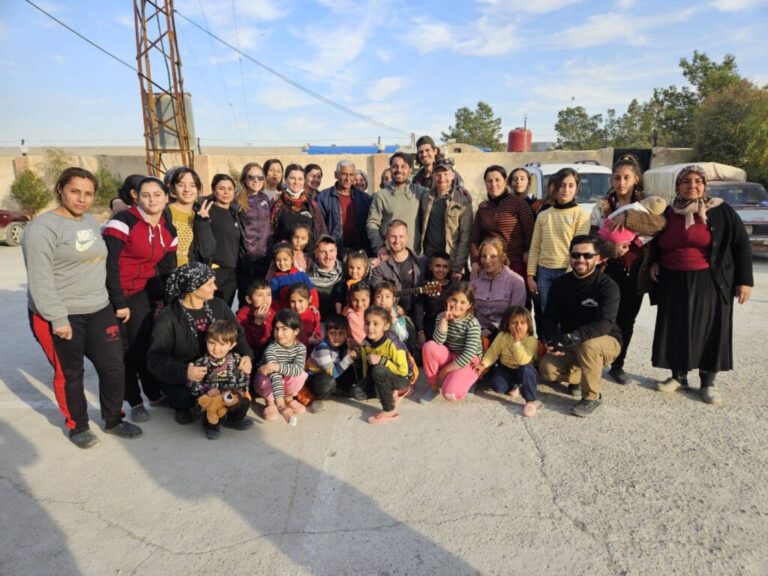By Nile Hosni —
The Free Burma Ranger medical missionary group recently helped Syrians fleeing the carnage to the city of Hasakah in the northeast of Syria.
For many of the Internally Displaced People (a “refugee” who hasn’t left his country to escape the war), it was NOT the only time they fled conflict. The first time they fled was in 2018 when they ran away from Turkish attacks on their native Afrin, a city in the northwest of Syria.
Just in December, they fled again from Shahba’a from the Free Syria Army, a force armed and trained by Turkey to pursue the Kurds. They left with only the clothes on their backs, walking or hitching rides for more than 200 mile journey out of the conflicted regions.
FBR is a group of Christian medics who aid the victims of the military oppression in Myanmar (formerly called Burma). It is led by Dave Eubank, a missionary kid who became a special operations military in the U.S. before accepting a unique invitation to bring the gospel to the unreached people of Myanmar in the hinterlands of the mountains in 1997. Since achieving some noteriety, they have branched out to aid with medics in other war zones around the world, like Iraq.
From Jan. 20 to Feb. 13, an FBR team administered medical car to 901 patients in 21 separate IDP camps in northwestern Syria. FBR also performs Good Life Club programs (like a one-day Vacation Bible School) for the kids, many of whom have never heard the gospel. These kids have known the horrors of war and haven’t smiled for days, weeks or even months. To sing Christian songs and get a gift brightens their faces.
Medical patients included chronic diseases and acute infections, such as gastroesophageal reflux, lumbar disc hernias, stunting, anemia, scabies, cutaneous leishmaniasis, epilepsy, and even undiagnosed tumors and congenital heart diseases. FBR performed various procedures, such as fracture splinting and wound cleaning for diabetic foot infections. Ppatients needing specialty care—such as those with congenital heart diseases or cancers—were referred them to more advanced facilities for further treatment.
The simple lack of hygiene in many camps, due to lack of facilities and cultural practices that ignore hygiene, led to higher rates of diarrhea, intestinal parasites, and skin diseases amongst the camp residents. In addition to treating these conditions, FBR focused on patient education and advocated for improved hygiene facilities with camp authorities. FBR also distributed over 1,000 ready-to-use nutritional supplements and more than 700 one-month vitamin boxes to address malnutrition, which can cause stunting in children.
Many of FBR’s patients had been displaced as recently as the previous two months, missing out on essential prenatal care and chronic disease management. FBR provided prenatal care to 12 pregnant women and treated over 100 chronic disease patients. Among them, six were newly diagnosed with type 2 diabetes, and two with high blood pressure. FBR also followed up with 15 young patients suffering from congenital heart diseases, although some families are struggling to access or afford the complex surgeries their children need.
One of the most devastated families we encountered consisted of four members who were sick, three of whom face serious, life-threatening conditions. The youngest, a little girl, has a rare congenital heart defect called Pentalogy of Fallot. She has undergone several medical studies but has not been able to receive surgery due to the high cost. She was referred to a specialty hospital for treatment.
The son, now 30, has a permanent developmental disability and recently lost vision in his right eye. Doctors discovered a tumor inside the eye, which requires immediate specialized treatment to rule out malignancy. Partial vision recovery seems unlikely, and he has been referred for ophthalmological care, FBR reports.
The mother suffers from severe alopecia areata, which caused her to lose most of her hair, a shame for her in Middle Eastern culture. Thankfully, she was given treatment to prevent further damage. The father has Type 2 Diabetes and lung cancer and was unable to attend to his chemotherapy treatments in Damascus due to the war. FBR provided medications for three months and some financial support for his next chemotherapy session.
Despite the family’s hardships, the father, a Christian man, remains strong in his faith, trusting that God will provide for their needs.
In addition to providing physical care, FBR also offered emotional and spiritual support, creating a safe space for individuals and families to share their stories, offering a listening ear, a shoulder to cry on, and prayer for those who welcomed it.
The following are just a few stories shared with our team. Names and identifying details have been removed to protect the families’ privacy and prevent retaliation for sharing their experiences. While some families were more reluctant to speak than others, all of them expressed a common request: to share their stories with the world, particularly with the West, so that people would not forget them and would understand the reality of what is happening to them.
Here are some eye-witness accounts of the IDPs:
One mother in her forties, traveling with her son, walked 90 kilometers over three days, fleeing Shahba’a to Tabqah, and eventually reaching Hasakah with no food or water. During their escape, they witnessed the brutality of the FSA, who killed civilians and looted their belongings. Similarly, a young woman originally from Afrin fled when Turkey attacked in 2018, first seeking refuge in Shahba’a, then fleeing again to Hasakah in December 2024 after the FSA attacked. She endured verbal abuse from the FSA, but remained silent, fearing further provocation.
A young man in his early twenties shared how his family fled Shahba’a, was processed in Tabqah, and then directed to Hasakah. He expressed a deep longing to return to Afrin, where he had lost his uncle in the 2018 fighting. As they fled from Shahba’a, he witnessed the FSA robbing people. He even saw the FSA kill a Kurdish man for his motorcycle. They stopped the man, initially allowed him to ride on, and then shot him as he rode away. Another man in his forties described how fleeing Shahba’a was even worse than their previous escape from Afrin. He recounted seeing the bodies of regime soldiers and children, as well as the violence committed by Turkish-backed forces. Other families shared similar traumatic experiences, including witnessing murder, mutilation, and destruction.
FBR’s Good Life Club programs for children were presented in English, Kurdish and Norwegian. They played games, shared Bible stories using colorful bracelets, and distributed Lion and Lamb stuffed animals that play music and Bible stories in Kurdish. The children were overjoyed by the attention and joy brought into their lives, even if only for a brief time.
One child said, “We were sad before you came, but now that you are here, we are so happy!”
Related content: An explainer of the Houthis and the chaos in the Middle East, why Gazans hate Hamas, the Thai hostage abducted by Hamas, terrorists are already in America.




